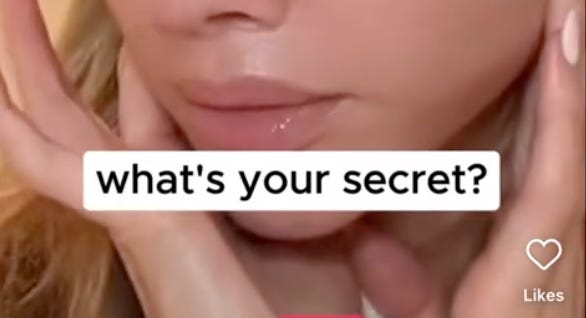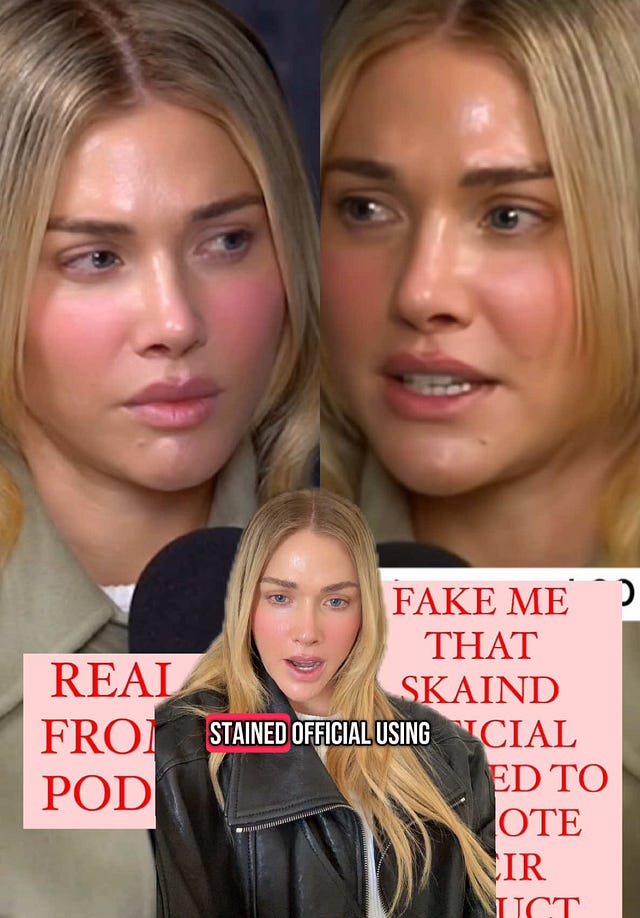Creepy Skincare Brand Stole People's Faces For Their AI Video Ads
Yep, this is the exact thing we were worried would happen.
AI, for the most part, is theft. AI music steals from musicians. AI visual art steals from real artists to make fake art. AI writing steals from writers to make very, very bad writing. Mark Zuckerberg even approved of Meta using copyrighted works to train its AI program, Llama — and they’re now being sued by Sarah Silverman, Junot Diaz, Ta-Nehisi Coates and others because of it. In fact, AI literally steals from human beings for the explicit purpose of putting human beings out of a job. Jobs like making music, making art, writing (because god forbid it be used to do work people don’t actually want to do) … and even product endorsements.
Recently, Skaind — which is a skincare brand and not, in fact, a band that does ska covers of Staind songs as one would naturally assume — did just that. They made a whole ass fake podcast interview between influencer Arielle Lorre and podcaster Rich Roll in which Lorre talks about her skincare journey, appearing to credit the brand for her lovely skin.
Except the thing is, neither of them ever met one another and neither of them have ever heard of Skaind. Or they hadn’t, until people started messaging them to tell them that they were in one of their ads.
Lorre, the ex-wife of producer Chuck Lorre, explained how it all went down in a video published to TikTok.
 Tiktok failed to load.
Tiktok failed to load.Enable 3rd party cookies or use another browser
Lorre sent Skaind a message before having her attorneys send them a cease and desist, and somehow their apology just made it all the more creepy.
“We wanted to apologize for the use of a video clip of you in our recent advertising campaign. We want to clarify that at no time was it our intention to use your image or voice without authorization,” they wrote. “Our marketing team accessed this content through an artificial intelligence platform without being aware that it was a recognized person or with image rights.”
While the idea of a marketing team being able to trot on over to to an artificial intelligence platform and make a video of anyone endorsing their product is creepy enough to begin with, the idea that it’s only bad because she’s a “recognized person” is somehow worse. Does that mean it would be okay if they just plucked a random person without many followers off of TikTok or another video platform to endorse their product?
Of course, their claim that they didn’t know who she was also fell pretty flat, given all of the footage they had of her.
“In this over-two-minute-long video, they used a ton of b-roll video from my skincare videos, my various Tiktok and Instagram videos, they had a video of my boyfriend and I in there, so they very much knew that I’m a real person,” Lorre explained, adding that they took footage of her on her “own podcast and used that template to create the AI version of me.”
Their apology, too, felt a bit off when they went ahead and blocked both her and Rolls after their lawyers sent them cease and desist letters. Just a little bit shady. Of course, a skincare brand that has to steal the faces of people who have never actually used their product in order to promote themselves is pretty shady to begin with.
This isn’t totally, totally new as a concept. For years I’ve gotten ads on my phone featuring fake Shark Tank clips and Oprah endorsements for products that were definitely never actually on Shark Tank or endorsed by Oprah, though they weren’t AI. In 2023, Gayle King and Tom Hanks made headlines after two different companies used AI versions of them to sell their scammy products — in King’s case, some kind of weight loss nonsense, and for Hanks, a dental plan.
Meta pulled the ads featuring Hanks and King after this went public, with a spokesperson telling The New York Times that it is “against our policies to run ads that use public figures in a deceptive nature in order to try to scam people out of money.”
And yet! When Lorre asked them to pull the ad featuring her, she was told that it didn’t violate their community policy. So she’s not enough of a public figure for Meta to care but is known enough that Skaind says they wouldn’t have stolen her face if they knew she was a “recognized person.”
It’s one thing when AI is used to provide former Breitbart writers with “girlfriends,” to help people write emails to their coworkers, or to provide the rest of us with factually dubious answers to our Google queries. Or when it’s used for the music video for Pulp’s first single in 20 years, and it’s actually a criticism of AI (Jarvis Cocker specifically noted “no A.I. was involved during the process” of making their new album).
The real problem is when it’s used commercially to sell products or to make (non-critical) “art.” As Franchesca Ramsey, through whose social media I found out about this in the first place, put it: “This is the danger of using AI when you keep training it to make your ugly ‘art.’”
It’s especially creepy in this instance because both Lorre and Ross, while known to those who follow them, are only about medium-famous. They’re not Gayle King or Tom Hanks famous, but the only reason they found out that they were featured in this obscure skincare’s internet ad was because enough people saw them and told them about it. What happens when regular people with only 100 followers on TikTok, who don’t have the resources to hire lawyers to send cease and desist letters get their faces stolen by “AI platforms” and used in advertisements by equally obscure brands? What are the chances they’ll ever even found out, and what recourse will they have if they do?
PREVIOUSLY ON WONKETTE!








"Mark Zuckerberg even approved of Meta using copyrighted works to train its AI program, Llama — and they’re now being sued by Sarah Silverman, Junot Diaz, Ta-Nehisi Coates and others because of it."
When people say "it's better to ask for forgiveness than ask for permission", it just makes me think the penalty for not asking permission is clearly not high enough.
Forget "AI." That's just a tool. The skin care company stole the imagery and used it for profit, and Zuckerberg received and paid for stolen goods.
Doesn't matter whether they used a crowbar and set of lock picks, or "AI." They're thieves and fences.